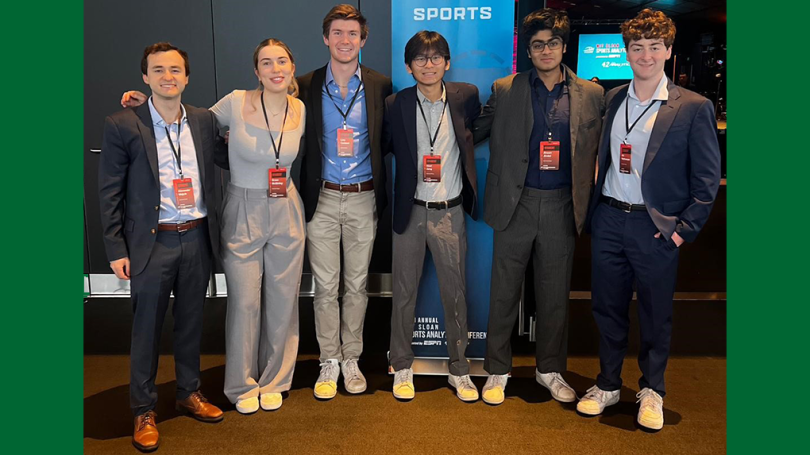
- Undergraduate
- Research
- About the Program
- News & Events
- People
Back to Top Nav
Back to Top Nav
Back to Top Nav
Back to Top Nav
The 2024 MIT Sloan Sports Analytics Conference was held on March 1-2 in Boston, and six Dartmouth students, Luca Caviezel '24, Noel Jang '25, Ahaan Jindal '27, Grace McGinley '26, Ari Nathanson '26, and Alex Wojcik '23, had the opportunity to attend. These students are members of the Sports Analytics Club at Dartmouth, which sponsors a research competition every year, the winners of which receive tickets to the MIT conference. This year's winners were Ahaan and Ari. Ari's article for the contest is here, and Ahaan's article can be found here. This year, the Program in Quantitative Social Science (QSS) supported the Sports Analytics Club's research contest and paid for the winners' tickets to the MIT conference.
We asked this year's six conference attendees about their experiences, and here is what they said.
Luca, a 4th year QSS major, had a lot to say about the MIT conference. "There is a big focus on using AI (the theme of the conference was AI) in sports not only for on field performance but also for managing the game day experience for fans as well as optimizing ticketing/marketing strategies. Teams have more data than they know what to do with and are often limited by the inertia of coaches who don't understand the power of analytics or trust themselves more. This is particularly true in soccer and football, where the head coach matters a lot more than in other sports. Having a full analytics staff is expensive, and a lot of teams outsource big chunks of their analytics work to outside firms. The director of baseball analytics for the Sounders noted that in soccer especially, the amount of data is outpacing analyses. He talked about how creating a good model is almost useless if you can't create visualizations to support it or if you are unable to present it effectively to decision makers. The average tenure of coaches in a lot of sports (particularly soccer in the premier league) is so short that many new coaches that come in are focused on winning in the near term to keep their job rather than building up a cohesive culture and style of play for the long term that is built on analytics."
Alex, another QSS major said, "As a soccer fan, I loved learning about how analytics has encouraged shots from shorter distances and how the sport is growing in the US. My favorite talk was the panel with Sue Bird, Jeff Van Gundy, and Nic Caserio on the underdog mindset. It was fascinating to hear about how top athletes are `clutch' and how that might be measured or understood. I also enjoyed meeting students from other schools and some professionals working for teams, leagues, or media companies."
Ari, also, a QSS major, and the president of the Executive Board of the Dartmouth Sports Analytics said, "One takeaway I had from Sloan is that numbers can be used not just to improve on-field performance, but also fan engagement. I attended a particularly interesting talk about how the Detroit Lions have used real-time tracking and advanced analytics to improve the stadium experience."
Ahaan, a first-year Dartmouth student, reported that, "The chance to listen from some of the most decorated names in the sports/sports analytics industry was eye-opening and reaffirmed the importance of big data both in and outside sports. I especially enjoyed the `David and Goliath' talk with Sue Bird, Daryl Morey, the GM of the Texans, Jeff Van Gundy: I learned about how leaders get their teams through dynasties and heartbreaks, and how they approach building successful teams. The chance to network with big players in the industry and speak to some of these leaders 1-1 was unique, I got a picture with the GM of the Mavericks, Nico Harrison, and spoke to him about the importance of effective negotiation. And getting to see Dartmouth Sports Analytics members go 1-1 in chessboxing and trying out the athlete recovery room was awesome."
Grace, a German and Economics double major and vice president of the Executive Board of Dartmouth Sports Analytics also has comments about the role data in sports. She learned "how analytics plays into more than just tactical decisions (like with the Detroit Lions stadium guy). I attended a hockey panel with an interesting combination of both former players and analysts and learned how they view statistics differently/how they view statistics to be important. Generally, one focus at the MIT conference was with the rise of ChatGPT and other AI models, and AI's potential future in the sports analytics world."
Noel, a Computer Science and Economics double major, had this to say: "It was interesting to see how the use of data analytics has significantly increased over the past decade in the Premier League. Listening to talks from the head of sports analytics from teams like Manchester City, Liverpool, and Arsenal gave insight into how data has been integral in those teams' recent success. Listening to former Premier League coach Jesse Marsch also revealed the interesting relationships between data teams and the head coach."